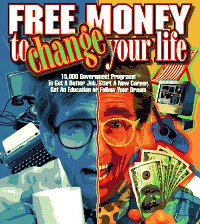| Is Money Free? | 2003-01-14 17:24 4 comments |
 by Flemming Funch by Flemming FunchBritt Blaser says some very interesting things about money and capitalism, which I'm trying to wrap my mind around. He says we're watching the death throes of what he calls "Managerial Capitalism", which I agree with. And he also seems to feel that a more grassroots kind of self-organizing, reputation based kind of economy ought to replace it, which I also agree with. And then he says: "Money is Free. Get Used To It."You know, Managerial Capitalism is based on a shortage of capital. I.e. capital is necessary, but there's never quite enough of it, so those who control it have the upper hand. But nowadays, at least in a place like the U.S., excess credit seems to be thrown at you. You can buy cars with 0% financing, and furniture or washing machines you don't have to start paying before a year or more later. So, capital is going towards being free. And governments that try to stimulate the economy will often, like Bush, do it by giving tax breaks to the rich, in the hope that they'll put the money into enterprises that do stuff. Except for that those enterprises don't really do the right stuff. And, ironically, if capital moves towards being free (freely available), then capitalism is on its way out, because there is no longer a scarcity to control. Hm, I sort of like that, but I'm not sure that's happening. I'd like it to happen. I don't exactly experience an abundance of capital personally, but I can see that it sort of works like that for a fairly large segment of the population. And it certainly seems to be working in the big corporate world. It matters very little what things cost, or how much effort is wasted needlessly, because there is plenty of capital. But what is the bigger reason for the demise of traditional capitalism would be as he says: "Equity markets systematically move money from the less informed to the better informed.Capitalistically funded and traditionally managed big companies are terribly inefficient and deliver things many people don't really want, and they're bad at leading people to fulfill their potentials and use their skills really well. So, why are they still the main thing? I'd say, because of the first point, that the people who create them are more well-informed about some important things than you and I. Not well-informed about what we really want, or the best ways of producing that, but well-informed about capital - how to get it, keep it and increase it. And how to keep the general public in the dark concerning your game. They make it look like we all can be co-owners of the capital, owning stocks, investing, having good credit, having a nice credit line, etc. But that is just a distraction, I think. The real thing that would make a difference would be the information about how to organize people and resources efficiently and effectively, without needing investment capital and without needing managers. I.e. the knowledge of how to bring the elements into synergy, without requiring the one guy with all the money to be in charge. |